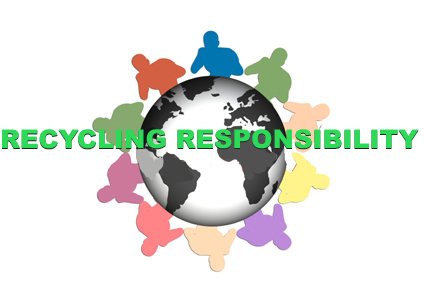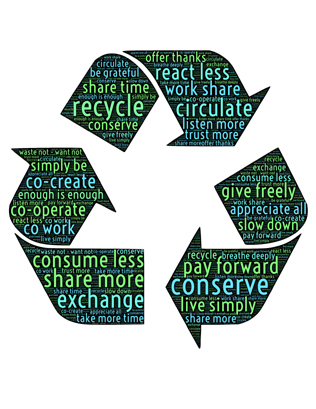Recycling Is Our Responsibility
RECYCLING IS OUR RESPONSIBILITY ~ ISSUE 196 ~ OCTOBER 13, 2015
By Diane Gold
 Recycling is our responsibility, a task that most of us choose to be environmental stewards and better our planet, present and future. We do it for ourselves, our families and our planet’s longevity. The amount of money companies make as a result of our actions is not of concern to most of us.
Recycling is our responsibility, a task that most of us choose to be environmental stewards and better our planet, present and future. We do it for ourselves, our families and our planet’s longevity. The amount of money companies make as a result of our actions is not of concern to most of us.
Preventing waste (by being more aware, recycling and composting), reducing air pollution (from waste incineration), reducing water pollution (from landfill dumps and soil leaching) and lowering gasses (that develop in landfills) are of concern.
WHY WE RECYCLE
Some of us consider it our duty to contribute to the health of our environment, almost as a give-back to Earth for being there for us to live. We do it as a labor of love, knowing it is our sacrifice in time, energy and effort. It is done without question. We also believe that our cities, counties, states and federal governments have a duty to allot budget to selfless recycling programs that look out for the welfare of our community, region, country, planet.
Others of us have reasons which directly relate to what we see and feel in our immediate environment. We want to live in a clean environment where we (1) don’t have to look at a pile of plastic at the end of our canal, (2) don’t see random plastic strewn all over the streets, (3) go to the beach and don’t see garbage in the sand or at the shoreline and (4) boast about how clean our community is.
And then, there are those of us who are involved in the business of recycling and do it for the money.
RECYCLING AND HOW IT HELPS
Last week, a journalist, for a major newspaper, wrote an article that questioned whether recycling helps. His slant mentioned nothing about our duty to do everything we can not to waste, so here I am. His article rightly questioned whether the amount of water we use to clean what we recycle wastes more than it gains. Of course, we need to consider water resources and money to pay for them vs. greenhouse gasses and landfill space if we don’t recycle.
But the essence of recycling lies on our responsibility to the human condition, to do it for benefit of our sisters, brothers, families, ourselves.
MONETARY VALUE OF RECYCLING
We, outside the recycling industry, don’t care about how much money the industry makes. We do care how much money we save in clean up costs for our land, rivers, lakes and oceans. And we certainly care about how clean our air supply is.
It’s a good thing if the town, county or state makes a great deal with the recycling industry, and campaigns for us to do more of it. It’s also superb when the recycling industry makes money. But, if there comes a time when recycling becomes unprofitable for the industry, it is time for the government to allot money for such a purpose.
WTE FACILITIES – FOR WHAT WE CAN’T OR DON’T RECYCLE
Waste-To-Energy facilities are those that burn our garbage and use the result to produce electricity. Some people are concerned with the toxic emissions that are released from this burning including the fly ash and bottom ash. Advocates of the WTE method see the other side: the increased greenhouse gas (GHG) and toxic chemical compounds that are released and leach from landfills for waste that has not been incinerated first. (FYI, after the incineration process, the resulting ash is usually put in the landfill.)
In Sweden, their use of incineration for electricity is working well. In Portland, Maine, ecomaine, a WTE since 1989, burns the community’s garbage and produces enough electricity for some of the community’s homes. http://www.ecomaine.org/electricgen/processdiagram.pdf
Advocates of burning refuse say that the amount of carbon released into the atmosphere from incineration is two-thirds less carbon than that released from landfill waste dumped without incineration. The discussion continues.
CONCLUSION
Recycling matters. It matters to each one of us, whether we think about the future of the planet or we think about our comfort level in the parks of our communities.
 The first thing to keep in mind is that recycling is our responsibility for our home, whether it is a castle, a shack or the planet. We are not entitled to much after we become adults unless we work for it. As long as we put something in, we can create the best our situation has to offer. And, to prepare children to become responsible adults, recycling ed has to start immediately.
The first thing to keep in mind is that recycling is our responsibility for our home, whether it is a castle, a shack or the planet. We are not entitled to much after we become adults unless we work for it. As long as we put something in, we can create the best our situation has to offer. And, to prepare children to become responsible adults, recycling ed has to start immediately.
ACTION STEPS
Here are several action steps that will be helpful.
1) Find out what you are permitted to recycle in your community recycling bins. Only recycle those items.
2) If there are no bins provided at your individual homes, call the jurisdiction in which you live or the surrounding areas and find out what community facility allows free recycling. Make a schedule to use it.
3) Call your county to find out whether your county recycling facility has more choices than your local bin. If yes, plan to recycle what you can’t locally when you make a trip close to the county facility. Don’t consider the time you will use to do this. It is part of your duty. Do consider the gas you will use. If the facility is very far, plan a monthly trip with friends who will also recycle.
4) Educate your children as to what numbers (1) through (7) mean in the way of containers. Children enjoy memorizing numbers that represent objects. This identification process can become a fun game that will instill recycling in them. If you do not have children or grandchildren, educate an adult.
5) Explain to your children that each of us has a responsibility to account for our waste. Talk about using just enough and how recycling can benefit us right now and in the future. If you do not have a child to whom to talk, talk to an adult about this subject.
![]()
If you wish to share your story, please hit reply in your email program to be contacted.
If you need habit help, go to warriorsofweight-consulting.
![]()
FEEDBACK
We value your feedback very much.
Please leave a comment below.
Please LIKE us on the website and at
WarriorsOfWeight on Facebook.
You can also follow us on Twitter @warriorsoweight.
Thanks.
![]()
DIANE GOLD, PUBLISHER AND AUTHOR
Diane Gold, Founder of Warriors of Weight, Turning Habits Into Health, is a mentor in tai chi, kung fu and meditation, a music, fitness and stress expert, dedicated mom, studying peaceful conflict resolution, habit replacement and certified in plant-based nutrition.
She has been close to recycling since the 80s and, at one time, wanted to be the recycling coordinator of her town.
She says,
“It is very disturbing that we don’t approach certain things as responsibility. Recycling is something we have to do for our planet. Or we have to come up with another way to reduce waste. If there’s a better way, let’s hear it. Please shout it out.
In reading about the disposal of ash after waste management combustion, it seems hugely complicated to neutralize the toxins that are formed. Do we know how? Do they know how in Sweden?
“Let’s keep working to figure out the best method to recycle our waste, but let’s keep recycling and educating in the meantime. We need more. We need government support. We need it now. Not only if it benefits an industry but so that it benefits the longevity of the human race.
“Finally, let’s take overall good care of ourselves because we are so worth it.”![]()







